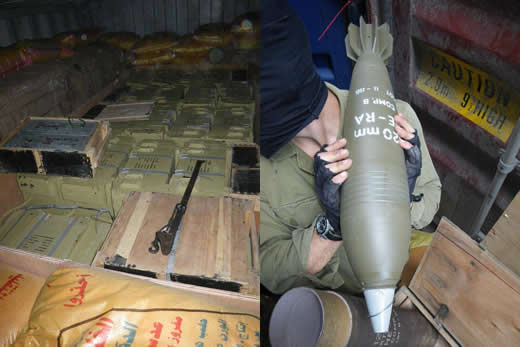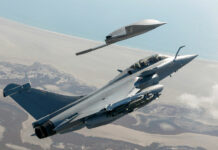
This morning Israeli Naval vessels intercepted the Liberian flagged cargo ship ‘Victoria’ about 200 miles west of the Israeli coast, after intelligence reports indicated the vessel could be carrying arms shipments destined for Gaza.


An initial investigation revealed the ship was loaded with C-704 anti-ship missiles – shore-to-sea missiles with a range of 35 km that could put at risk Israeli vessels at sea as well as strategic infrastructure targets near Ashkelon. Iran is known to possess and is actually producing such missiles, which, along with identifying documents (including a missile identification document, below) gives substantial evidence of Iran’s involvement in the weapons smuggling attempt, and yet another example of Iran’s use of innocent merchant ships as a means of transferring arms to terrorist organizations.
By first daylight, Naval commandos boarded the vessel and verified the existence of weaponry on board. Following the encounter with the Israeli Navy the Victoria headed to an Israeli port of Ashdod for detailed inspection of its cargo. The vessel was on its way from Mersin Port in Turkey to Alexandria Port in Egypt. According to Israeli assessments, the true destination of the weapon shipment was probably the Egyptian port of El-Arish, from where the shipment would be smuggled on land, through tunnels, reching terror organizations operating in the Gaza Strip.
According to shipment documents and crew questioning, the vessel initially departed from Lattakia Port in Syria and then proceeded to Mersin Port in Turkey. “Turkey is not considered as involved in the incident in any way” an Israeli statement clarified.
The interception of the Victoria today is only one stop in the Israeli pursuit of arms transfers from Iran to terror organizations in the Middle East, including Hamas and Hizbollah. Interestingly, the recent vessels involved in arms smuggling from Iran – the Hansa India, Francop and Victoria were registered in Germany.
Some of the Iranian arms shipment interdicted by the Israel Navy in recent years include:
May 7th, 2001: The Santorini, a Syrian registered ship acquired by the PFLP-GC terrorist group, was intercepted on its way from Lebanon to the Gaza Strip. It carried 40 tons of weapons, including anti-aircraft missiles, mortars, rifles and guns, grenades, mines and explosive material, anti-tank RPG-7 missile-launchers, and artillery rockets. The ship’s captain, a convicted weapon smuggler and two of his relatives abroad the ship had been involved in three previous smuggling attempts backed by Hezbollah and PFLP-GC. Part of the anti-tank weaponry originated from Iran.
January 3rd, 2002: Karin-A was intercepted in the Red Sea, heading towards Gaza. The ship 50 tons of weapons packed in 80 submergible containers. The shipment included RPG-7 rockets, RPG-18 anti-tank rocket launchers, Iranian-made anti-tank and anti-personnel mines, 2,200 kg of military grade high-explosive, assault rifles, machine guns, and hand grenades, 700,000 rounds of small ammunition, and diving equipment. The submergible containers were to be dropped into the sea and then washed ashore the Gaza Strip or picked up by a smaller vessel and delivered to the Strip. The PLO and leadership of the Palestinian Authority were directly involved in the plan. The ship was purchased in Lebanon and sailed to Sudan and Yemen to pick up civilian goods to disguise the weapons aboard.
May 21st, 2003: Abu Hasan, a fishing boat was intercepted at sea west of the Israeli port of Haifa, sailing from Lebanon to Egypt carrying a shipment of explosives sent from Lebanon, bound for the Gaza Strip. The cargo also contained radio-activation systems for remote activation of explosive charges, rocket fuses and detonators.
October 12th, 2009 Hansa India sailing from Iran flying a German flag, Hansa India was due to unload a cargo of eight containers in Egypt. Following warnings from the German authorities, the vessel was not unloaded and continued to Malta where it was seized and found to be carrying bullets and industrial material intended for the production of weapons, seemingly bound for Syria.
November 3th, 2009: Francop, a German vessel was intercepted by the Israel Navy off the coast of Cyprus en route from Iran to Syria, The ship contained 36 containers with 500 tons of arms: 9,000 mortar bombs, 3,000 Katyusha rockets, 3,000 gun shells, 20,000 grenades and half of a million rounds of small ammunition, all hidden behind sacks of polyethelene. The arms shipment was bound to be transferred on land to Hezbullah in Lebanon. The Iranians exploited a civilian ship with its crew unaware of the cargo they were transporting. The weapons cache was loaded at the Bandar Abbas Port in Iran on an Iranian vessel and was transferred at an Egyptian port, unloaded onto the Francop.

















